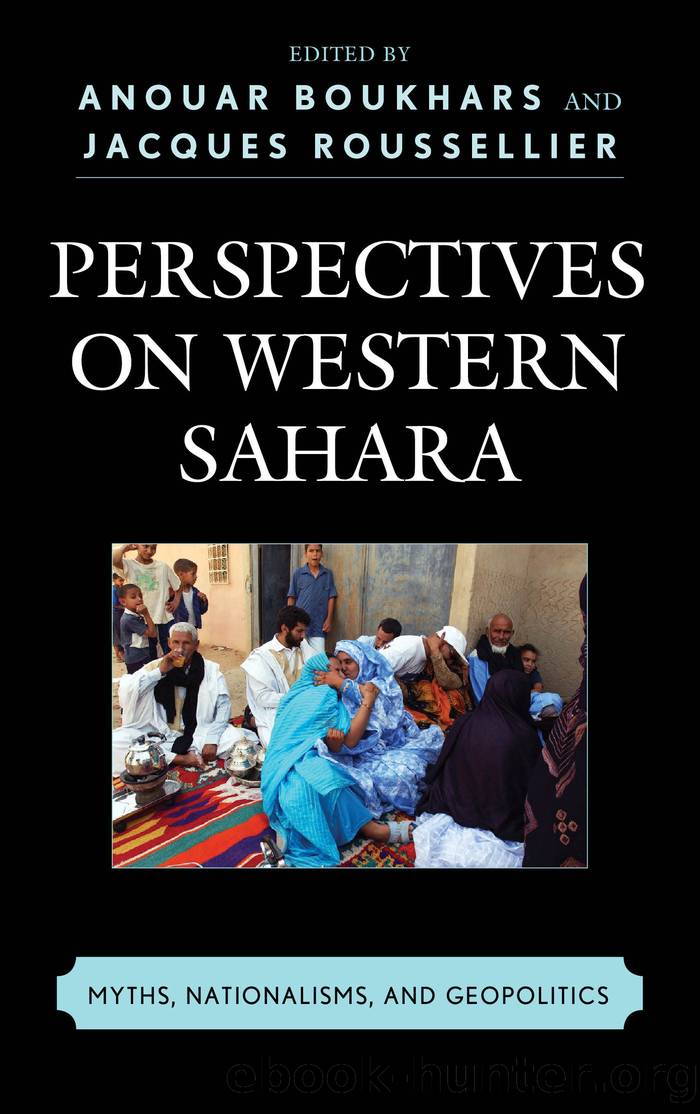Perspectives on Western Sahara by Anouar Boukhars

Author:Anouar Boukhars
Language: eng
Format: epub
Tags: undefined
Publisher: Rowman & Littlefield Publishers
Published: 2012-01-15T00:00:00+00:00
Conclusion
With regard to Africa (OAU/AU), the Western Sahara conflict has become less central even before the cease-fire of 1991. Even if, on the diplomatic front and thanks to the commitment of Algeria, the Polisario seems at this moment to have strong support within the AU, Morocco succeeded in 1980 and 2000, with other African states, to adopt a pragmatic approach to their relationships and since then has gradually intensified its presence on the continent. However, due to support for SADR from several key African regional powers and the AUâs rigid constitution, the Moroccan kingdom failed to expel the SADR from the AU. Thus, the AU majority position still regards the SADR as the representatives of the Sahrawi people and Morocco as a colonial power.
The same deadlock repeats itself on the European continent, but for different reasons. In bilateral relationships, France supports the autonomy solution proposed in 2007 and does not want to force Moroccoâs hand on the Western Sahara issue. Spain is more ambivalent, partly because of the historic attachments to the region, its guilt over its former colonial role, but also because of the importance of other issues that impact Spainâs Sahara policy, chiefly the territorial disputes around Ceuta and Melilla. Second, at the EU level, the commission has chosen to support tight relationships between Europe and Maghreb and refuses to make any political commitment in a conflict in which there is no consensus between European countries. With the strengthening of Parliamentâs authority in foreign policy and the entry in the EU of countries as Sweden and Finland in 1995, the Polisario has gained new supporters to strengthen its voice. Northern European countries are indeed very sensitive to human rights concerns and voice respect for the principle of self-determination, which impact their relations with Morocco. In 2006, the Fishing Agreement between Morocco and the EU came up against opposition from Sweden, Denmark, Finland, and the United Kingdom. Five years later in February 2011, while most permanent representatives of Member States supported the commissionâs proposal on Fishing Agreement with Morocco, the Swedish minister of fishing still expressed his opposition.
In the coming years, it is unlikely that there will be any major changes in the relationships between Morocco and the EU. On the one hand, Polisarioâs supporters remain a minority. On the other hand, EU remains a community of states with a cult of national sovereignty in foreign and defense policies. The creation of a European External Action Service does not alter limitations of a Europe that is challenged in developing a role for weighing in on the resolution of conflicts. This new service is merely an implementation tool for relaying policies in support of member statesâ diplomacies and not for defining policies. Moreover, Parliamentâs role is ever limited. With the Lisbon Treaty, it plays an increasing role in European politics and contributes to the development of community legislation on an equal footing with the council. The co-decision procedure is also enshrined as âordinary legislative procedure,â and its field of skills has been extended significantly.
Download
This site does not store any files on its server. We only index and link to content provided by other sites. Please contact the content providers to delete copyright contents if any and email us, we'll remove relevant links or contents immediately.
The Secret History by Donna Tartt(16717)
The Social Justice Warrior Handbook by Lisa De Pasquale(11506)
Thirteen Reasons Why by Jay Asher(7831)
This Is How You Lose Her by Junot Diaz(5826)
Weapons of Math Destruction by Cathy O'Neil(5077)
Zero to One by Peter Thiel(4867)
The Myth of the Strong Leader by Archie Brown(4809)
Promise Me, Dad by Joe Biden(4476)
Beartown by Fredrik Backman(4464)
How Democracies Die by Steven Levitsky & Daniel Ziblatt(4447)
Stone's Rules by Roger Stone(4438)
The Fire Next Time by James Baldwin(4371)
100 Deadly Skills by Clint Emerson(4106)
A Higher Loyalty: Truth, Lies, and Leadership by James Comey(4059)
Rise and Kill First by Ronen Bergman(4043)
The David Icke Guide to the Global Conspiracy (and how to end it) by David Icke(3912)
The Farm by Tom Rob Smith(3893)
Secrecy World by Jake Bernstein(3806)
The Doomsday Machine by Daniel Ellsberg(3757)
